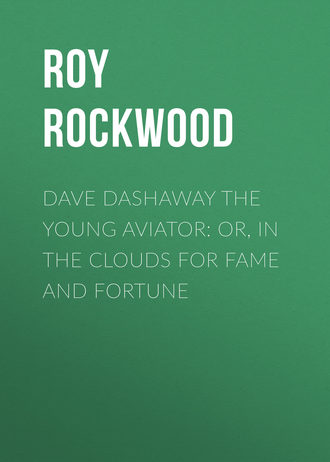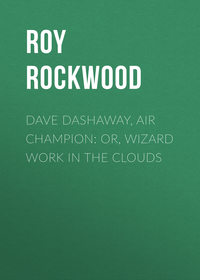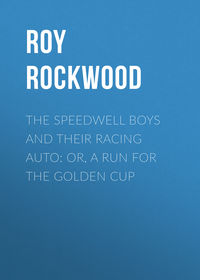 полная версия
полная версияDave Dashaway the Young Aviator: or, In the Clouds for Fame and Fortune
“Say,” he cried, all excitement and curiosity, “where have you been?”
“Long story. Want to see Mr. King first. Have you seen him?”
“Have I seen him?” repeated Hiram volubly. “He woke me up at midnight, worried to death about you. Made me get up and join him in a search. He said it wasn’t like you to be off skylarking, with all there was to think about, arrange and do for today’s flight.”
“He was right there.”
“I knew it, and told him so,” said Hiram. “Then he got thinking there was foul play somewhere.”
“There was,” assented Dave.
“That Jerry Dawson?”
“I don’t know.”
“You don’t know?”
“Not positively. Keep along with me, and I’ll tell you all about it. I’m on pins and needles till I reach Mr. King. Say, Hiram, answer me one question.”
“Yes, sir!”
“Has anything happened to the Aegis?”
“Why, what could happen?” inquired Hiram in a puzzled way.
“It’s all right?”
“It was an hour ago, when I was up at the camp. Mr. King was oiling things up himself, and in a great stew about you, but the Aegis was the same old beauty.”
Dave heaved an immense sigh of relief. They were just then passing the shed into which he had run to escape his pursuers the evening previous. Dave was about to point it out to his companion and relate his adventures, when he noticed a big placard on the side of the shed.
“What’s that, Hiram?” he asked.
“Oh, that?” repeated Hiram. “It’s the talk of the meet. That’s Marvin’s monoplane, you know.”
“Yes,” nodded Dave.
“Well, some one sneaked into the hangar last night, when all hands were away, and wrecked the machine.”
“Why!” exclaimed Dave suddenly – and then added to himself: “I understand!”
“That placard,” continued Hiram, “is an offer of a reward of one hundred dollars for the detection of the vandals who did the dastardly work.”
CHAPTER XX
IN TRAINING
Dave did not speak nor linger. His quick mind was thinking very actively, though. He fancied he understood what the wrecking of the Marvin monoplane meant now.
As they passed the open doorway of the shed Dave could see a crowd inside inspecting the monoplane it contained. A man he recognized as Mr. Marvin, the wealthy amateur airman, was moving about restlessly and talking in an exciting tone.
“It’s a blazing shame!” broke out Hiram. “Mr. Marvin intended trying a flight himself to-day. Everybody was encouraging him, and pleased about it. He’s been awful kind to the air folks, you know.”
“Yes, I’ve heard about him,” said Dave.
“He donated several of the medals last meet, and made up losses for the crowd where things didn’t pay.”
“Do they suspect anybody?” asked Dave.
“No,” replied Hiram, shaking his head slowly.
Then he flashed a shrewd look at Dave, full in the face, and bolted out the quick challenge:
“Do you?”
Dave changed color. He walked on a little faster.
“Why, yes, I do, Hiram, to tell you the truth,” he replied.
“Who is it?”
“I don’t like to say, Hiram, till I am sure.”
“Say, Dave Dashaway,” declared Hiram. “I can bet who it is, first shot. It’s Jerry Dawson, and you’ve been through a big tussle, for your face is all marked up and you look peaked and worried. Isn’t it that Dawson fellow, now?”
Dave was silent.
“Say,” stormed Hiram, “if you don’t answer, I’ll start right out and find young Dawson, and knock the truth out of him, along with all the rest of his meanness.”
“You must do nothing of the sort, Hiram,” remonstrated Dave. “You mustn’t guess anything, or mix up things, until I have seen Mr. King.”
“You make a fellow mighty curious.”
“You will know all about it soon,” promised Dave. “There is Mr. King now.”
Our hero hurried forward as he saw just outside the Aegis hangar his employer and old Grimshaw. Mr. King uttered a glad cry as his eye fell on Dave. The old trainer nodded as pleasantly as his grim face would allow.
“Why, Dashaway, where have you been?” asked Mr. King quickly, looking Dave over as he would a runaway aeroplane returned.
“Oh, I’ve had a little adventure that isn’t worth the telling, with all there is to do here this morning,” declared Dave evasively, pulling off his coat and making a great ado of seeking some immediate work.
Dave had made up his mind to defer any explanation until later in the day. He realized that it would disturb his employer to relate his adventures and suspicions. Mr. King, too, was a hasty man. Dave knew that it would be just like him to rush off to Mr. Marvin, charge the Dawsons with the wrecking of his monoplane, and become generally unnerved for his critical duties of the day.
Later Dave learned that the men who had kidnapped him had displaced three important parts of the Marvin monoplane. This had rendered it impossible to use the machine for the day. They had probably thrown the stolen parts into some pit or creek. It was evident that the two vandals had blundered all along the line. They had supposed that the shed where they had cornered Dave was the Aegis hangar, and had dismantled the wrong machine.
Dave became so active, and there was so much to do, that he soon drifted his employer’s thoughts from himself. Mr. King insisted on some explanation, however, and Dave evaded direct information by saying he had got into a farm wagon by mistake, was carted away, and slept in the vehicle all night.
Within an hour Dave and his own little personal affairs were obscured and forgotten for the time being, amid trials of skill and the general environment of an aero meet. As soon as the programme for the day was started, it was one engrossing novelty and thrill after another.
The Aegis was in for the altitude race. Dave was doubly glad that he had not bothered his employer with the real explanation of his absence the night before. The airman was a superb picture of courage, confidence and expertness as the Aegis bounded from earth and rose in the lead over the fleet of airships entered for the contest.
Dave helped in skidding the machine at the start, and was promptly on hand when the Aegis sailed gracefully down to its starting point with a score of six hundred extra feet to the Fairfield record.
Mr. King was busy after that consulting with and aiding other aviators in their scheduled feats. Dave was just finishing a cold lunch at the hangar, when old Grimshaw poked his head into view past an open doorway.
“Off duty, lad?” he inquired, his twinkling eyes telling Dave that he had something on his mind.
“Why, Mr. King has finished his part in the programme,” replied Dave. “I’ve cleaned up the Aegis, and just waiting for orders.”
“Well, I’ve just seen him, and it’s all right. Like to make some extra money, Dashaway?”
“Always ready for that,” replied Dave.
“Then you come with me,” directed Grimshaw. “We’ve got a quiet corner over against the hangars, and I want you to put in all your spare time for the next two days on biplane practice.”
“Anything special?” asked Dave, with a hopeful smile.
“I’ll answer that when I see you do some grass cutting on the double whirl – which you’ll do,” replied Grimshaw with a chuckle.
All that afternoon Dave was put through a series of trial flights by Grimshaw. The attention of the crowd was centered upon the main features of the course, and they were unhindered and practically unnoticed in their efforts. Dave made several rapid flights.
“You’re going to do,” commended Grimshaw with great satisfaction, as Dave brought the biplane back to earth for the sixth time without jar or injury.
“Do for what?” inquired Dave.
“You come down here to-morrow at the same time. Next day, too. Then I’ll tell you something that will make your eyes snap.”
“But why all this mystery, Mr. Grimshaw?” inquired Dave with a smile.
“You do as I say, if you want to earn a record and some money as the aptest pupil I ever had,” was all that Grimshaw would explain.
Dave was helping the man cook get supper ready at the hangar when Mr. King put in an appearance. The aviator was in high spirits, for the day had been a successful one for him.
Dave told him about his experience with Grimshaw. The airman nodded pleasantly, as if he understood what was going on.
Hiram came strolling along just as they finished their meal. Mr. King adjourned to a pile of benches not in use at a little distance from the hangar. He settled down into a comfortable attitude.
“Now then, Dashaway,” he observed. “I’ve been too busy to bother with the mystery of your being away all last night. Not too busy, though, not to see that you didn’t tell enough about your being carted away in the wagon.”
“Yes, Mr. King,” chimed in Hiram. “He’s got a big story to tell, and I’ve been dying with curiosity all day long to know what it is.”
“Give us the story, Dashaway,” directed the airman.
Dave recited his adventures of the evening previous. Mr. King expressed the profoundest wonderment as Dave gave the simple details of his mysterious kidnapping. His fine face broke out into indignation and anger as Hiram cried out eagerly:
“Now then, Dave, tell him who was back of all this.”
“Why, are you sure I know?” asked Dave hesitatingly.
“It’s the Dawsons, Mr. King,” declared Hiram. “Listen,” and Hiram told about the two men whom he had seen conversing with Jerry Dawson.
Mr. King sprang to his feet, deeply aroused.
“So that is the secret of the wrecking of the Marvin machine,” he observed. “There is not the less doubt in my mind that the Dawsons are at the bottom of all this mischief. Now then, lads, I don’t want you to even lisp your suspicions to an outsider.”
Both Dave and Hiram promised that they would obey the injunction.
“I’m going to rid these meets of all this class of rascals, or know the reason,” declared the stirred-up airman with vehemence. “I shall have this affair run down to the limit, and if I fasten the business on the Dawsons, it will be a satisfaction to see them barred from all future aero meets.”
Mr. King walked excitedly away in the direction of the Marvin hangar. The two friends remained on the bench pile discussing the case in its various bearings.
Then Dave gave Hiram an inkling that Grimshaw had him in active training for some reason soon to develop.
“I hope I’m going to get a chance to do something worth while in the aero line, Hiram,” he said. “How I used to dream about all this when I was back at Brookville.”
“Was that where you lived, Dave?”
“Yes.” And one confidence led to another, and Dave found an interested listener to the details of his past life.
“Well, you’ve had quite an experience, haven’t you, Dave?” said Hiram. “That old guardian of yours is a mean one, and no mistake.”
“I’m glad to be away from him,” said Dave.
“Hello!” interrupted Hiram.
He jumped down from the bench pile, as he noticed a slouching figure moving stealthily away from the other side of it.
“Dave,” exclaimed Hiram, “do you know I believe that fellow has been listening to every word we said.”
“Why, what of it?” asked Dave.
“Don’t you know who he is?”
“No.”
“It’s a fellow named Brooks. He works around the hangars at odd jobs, and is a regular crony of Jerry Dawson. Hey, you,” shouted Hiram after the receding figure, “what you snooping around here, playing the eavesdropper, for?”
“Huh!” retorted the other, “what you coming along for and waking up a fellow when he’s taking a nap in the cool of the evening?”
Then the fellow walked on. There was a sneer and a menace in his vicious tones.
“I don’t like it,” said Hiram, half to himself, “I don’t like anything or anybody that mixes up with Jerry Dawson.”
CHAPTER XXI
THE AMATEUR TROPHY
“There’s your machine,” spoke Grimshaw, with a grin.
“My machine?” repeated Dave Dashaway.
“Yes, that’s the biplane I expect to see you handle better than any operator on the field, or I shall be mightily disappointed.”
It was early morning. Just as breakfast was over at the Aegis hangar, Grimshaw had appeared. He had nodded knowingly to Mr. King. Then he had taken Dave in tow; to lead him to his quarters, and back to a shed the doors of which he had just thrown open. The most exquisite little biplane upon which Dave had ever feasted his eyes was revealed to view.
“Why,” exclaimed Dave, “where did it come from?”
“Fresh from the factory.”
“When?”
“Last night. We housed it when everybody was asleep. I suppose you understand, Dashaway?”
“Hardly,” answered Dave in a vague tone.
“Why, what have I been training you for, do you suppose?”
“For this, eh?”
“What else? About a week ago the makers of that little beauty, which they call the Baby Racer, wrote to me asking if they could get a try out on the course here. They are stunting mostly for amateur patronage, and want to make a catchy showing. I fixed things with the show committee four days ago. The people who own the machine pay me one hundred dollars for my trouble. Half of it is yours.”
“Fifty dollars!” said Dave in a rapturous kind of a tone.
“It was hard work getting an extra number on the programme, but Mr. King has fixed that.”
“It’s to be a regular entry, then?” asked Dave.
“Yes, it is, and a silver cup trophy for the best exhibition. Three other new machines are in the contest.”
“But,” demurred Dave modestly, “you can’t expect me, a mere beginner – ”
“To win the trophy?” retorted Grimshaw, in one of his roaring moods. “I certainly do. Why, are you thinking of disgracing all my careful training, by making a fizzle of the chance of a lifetime!”
Dave was nearly overcome. He distrusted neither his own nerve nor the excellent training of his tutor, but the proposition was so sudden it almost took his breath away.
“See here, Dashaway,” broke in the old man, “you’ve done just what I told you in all our training stunts, haven’t you?”
“I’ve tried to, Mr. Grimshaw.”
“Well, you just keep up those tactics right along, and I’ll not steer you into any mishaps. There’s a big bulletin down at the pylon announcing this flight. Now get yourself in trim, to show the airmen what you’re made of. Have the little beauty out and look at her.”
Dave’s fascinated glance rested on a rare combination of grace and utility, as the Baby Racer was run out from under cover.
The machine was not a large one. It was a model of compactness, and had every latest improvement. Grimshaw operated the wings.
“It’s an articulated biplane,” he explained. “See here, where the wings are jointed and spread and close till they look like a big beetle. The fuselage is clear spruce. The landing chassis is made of rattan strips. See those reinforced skids, and that four cylindered aerial motor? The owners said she ought to have a muffler, for she spouts like a blast furnace when she starts.”
Mr. King came up, smiling and looking pleased, while tutor and pupil were looking over the Baby Racer. Then Hiram put in an appearance. He was so excited that he hopped around from place to place, telling Dave that he was the luckiest boy in the world.
By and by the news spread of the arrival of a new model, and a crowd began to gather. Airmen looked over the natty little machine and made their comments, pro and con. One fellow found all kinds of fault. Dave noticed that this was the most unpopular man with all the field, and the employer of the Dawsons at the present time.
“Who’s going to run her?” he asked of Grimshaw.
The old man placed a hand on Dave’s shoulder. The latter flushed modestly. The grumbler gave him a hard look.
“That kid?” he observed disgustedly.
“He’s one of my crack graduates, I’d have you know,” retorted Grimshaw, bridling up.
“That don’t make him eligible.”
“Eligible for what?”
“Running a machine on a licensed course.”
“I beg your pardon,” said Mr. King, stepping up, “but we have arranged all that. Here, Dashaway, keep that about you so you can answer any impudent questions.”
“A pilot’s license, eh?” muttered the fault-finder – “Oh, then of course it’s all right.”
“It’s not a pilot’s license,” Grimshaw told Dave after the fellow had sneaked away, “but it’s just as good as one. It’s a special permit, and Mr. King’s word and influence stand good for you.”
Dave passed three anxious but busy hours up to the time when the extra feature advertised was announced, and Grimshaw and two assistants wheeled the Baby Racer out upon the running course.
“Hop in,” ordered Grimshaw, as the spotless new model was ranged in the row ready for the start.
“There’s the signal,” spoke his assistant.
“Go!”
Dave bounded up into the air, as he got into position in the roaring machine.
Like a gull he soared from the ground and circled about the meadows to the left of the course. The pure white wings of the Baby Racer were dazzling in the sunlight, almost blinding the staring group of spectators.
Dave took in the position of the three other contestants. Then he paid strict attention solely to the directions his proficient teacher had given him.
From a height of several hundred feet Dave cut off the motor and glided within fifteen feet of the earth; then with a new roar the engine started again and up went the mammoth bird.
Not satisfied with his test, Dave speeded up and slowed down several times, and then darted to earth. Before the machine came to a full stop he started again and swooped upwards.
For a quarter of an hour the biplane soared above the course, made a final stop, and came back to the earth within a few feet of the starting place from its sensational flight in the clouds.
Dave caught the echo of vast cheering, and as he was hustled along to the Grimshaw quarters, he was conscious of being slapped on the back, of hearing approving comments. He was a little exhausted and light headed from the unusual spin, however, and glad to sit down in a reclining camp chair and get his breath.
Grimshaw left him with Hiram, who had abandoned work for the hour to give full attention to his friend.
“How did I do, Hiram?” asked Dave.
“You did it all,” declared his enthusiastic champion. “Why, those other fellows just lopped around like lazy flies. Not one of them went up over two hundred feet.”
A little later they heard Grimshaw approaching. He was chuckling and talking to himself.
“A big advertisement for my aviation school, hey?” he cried, bursting in upon the two friends. “Dashaway, when you get rested just drop down to the office and get that trophy.”
“I’ve won?” cried Dave.
“Skill, rapidity and altitude – all three points,” was the glad announcement of the old aerial engineer.
Mr. King came into evidence a few minutes later.
“I’m pretty proud of you, Dashaway,” he said, in his hearty, forcible way. “This means a professional dash pretty soon, I can tell you.”
About an hour later Dave and Hiram were making their way to the Aegis hangar. As they passed one of the temporary refreshment stands they came upon a crowd of five boys.
“It’s Jerry and his crowd,” whispered Hiram.
“Don’t pay any attention to them, Hiram,” answered Dave.
“I shan’t, unless they pester me,” replied Hiram.
With Jerry was the young rough, Brooks, the boy Dave and Hiram had detected behind the pile of benches. Three others Dave recognized as young loafers who followed the meets, working only occasionally.
They did not break ranks as they came up abreast of Dave and Hiram, halting them, which movement seemed preconcerted on their part.
“Say, think you’ve done it, don’t you?” sneered Jerry, looking straight at Dave. “Well, make the most of it. You’ll never take another fly.”
“Why won’t he?” challenged Hiram, making an aggressive forward movement. But Dave held him back.
“Because I’ve got you – got you right, this time, Dave Dashaway. Back to nature, back to the farm for you – ha! ha! ha!”
And Jerry’s companion joined him in his mocking jeer as they passed on their way.
CHAPTER XXII
A NIGHT ADVENTURE
“Hold on, Dave.”
“Don’t stop me.”
“Well, I declare!” cried Hiram Dobbs.
The country lad, developed into a first class “field” man, was almost thrust aside by the young aviator.
Dave Dashaway had certainly won this latter distinction during the past week. The morning of the cup trophy with the Baby Racer had been a start in the right direction. Two days later Dave had accompanied Mr. King in a non-stop race across the country, adding to the victory laurels of the popular airman, and to the vast store of practical experience that the lad had already acquired.
Mr. King had now filled all the numbers on the programme for which he had entered. He had promised Dave some “real work,” as he termed it, at the next meet. Then there had come an opportunity to enter Dave and the Aegis in a one hundred mile dash in which over half-a-dozen contestants were to take part.
For this, the most pretentious “stunt” he had yet attempted, Dave had been practicing all that day. Now, late in the afternoon, he and Hiram had strolled into the town. They were just passing the leading hotel of the place, when Dave grabbed the arm of his companion so suddenly and excitedly that Hiram regarded him in wonder.
He noticed that Dave was staring fixedly at a handsome blue painted automobile. That machine had just sped from the curb, a chauffeur in charge, a faultlessly dressed young fellow lolling back in the tonneau. Dave gasped, watched the auto whirl down the street at rapid speed, and then made a wild rush as if bent on following it.
“Hold on, Dave.”
“Don’t stop me.”
“Well, I declare!”
Dave had run out into the street. Hiram kept pace with him, wondering what in the world it all meant. Suddenly Dave turned in his course. He made a sudden dash for the curb where several taxicabs stood. Reaching one, of these, he touched the arm of its chauffeur waiting for a fare.
“Quick,” spoke Dave, “follow that blue car.”
“Hey, hello, who are you?” challenged the men, staring at Dave vaguely.
“Oh, afraid of your fare?” retorted Dave. “Here, I’ve got over fifty dollars in my pocket book.”
“He’s Dave Dashaway,” put in Hiram, as if that meant everything. “He works for Mr. King – you know him?”
“That crowd is good enough for me,” at once announced the chauffeur. “Jump in. What’s your orders?”
Dave sprang into the tonneau. The marvelling Hiram followed his leader. He could not imagine what Dave was up to, but he had confidence enough in his associate to feel that Dave knew his business on every occasion.
“That blue car, the one that just left the curb,” began Dave, leaning over towards the chauffeur, who had touched the wheel promptly.
“Collins’ car, yes,” nodded the man.
“Follow it till it stops,” directed Dave.
“That will be at Genoa.”
“How do you know?”
“I heard the fare give the order.”
“Well, keep it in sight. Can you do it?”
“Trust me,” responded the chauffeur, starting up his machine.
“Don’t catch quite up with them. I want to get off when that boy stops.”
“All right.”
The chauffeur speeded up. As he turned the next street corner the rear red lights of the blue auto could be seen a square distant.
Dave settled back in the comfortable cushioned seat like a person letting down after a severe strain.
“Dave Dashaway,” broke in Hiram at length, unable to restrain his curiosity any longer, “what does this mean?”
“Why, you heard me tell the chauffeur what I wanted,” said Dave.
“You are following that boy.”
“Yes.”
“Why, Dave?”
“Because I want to find out where he lives,” replied Dave.
“Who is he?”
“You remember my telling you about being robbed in a lodging house at Brompton, just before I came to Fairfield?”
“Oh, yes. You mean by the fellow who got Mr. King’s medal and watch and money?”
“That’s it.”
“A boy with a scar on his cheek?”
“Exactly.”
“Has this one, in that automobile?”
“I didn’t see. I didn’t have to,” replied Dave. “It’s there, though, don’t doubt it, for that is the fellow who robbed me.”
“Sure?”
“Oh, yes, I’d know his face among a thousand.”







